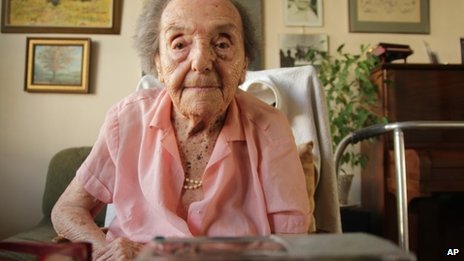The world’s oldest Holocaust survivor, Alice Herz-Sommer, died Sunday at the age 110 in London. Herz-Sommer, a pianist, born in Prague, was the subject of a documentary “The Lady in Number 6: Music Saved My Life”, nominated for an Oscar this year.
“Young people take everything for granted, whereas we, the elderly, understand nature, “ Herz-Sommer told Haaretz in an interview at age 106. “What I have learned, at my advanced age, is to be grateful that we have a nice life. There is electricity, cars, telegraph, telephone, Internet. We also have hot water all day long. We live like kings. I even got used to the bad weather in London,” she said.
Herz-Sommer was born on Nov. 26, 1903, in Prague, and started learning the piano from her sister at age 5.
As a girl, she met the author Franz Kafka, a friend of her brother-in-law, and delighted in the stories that he told.
She also remembered Kafka saying, “In this world to bring up children: in this world?”
Alice married Leopold Sommer in 1931. Their son was born in 1937, two years before the Nazi invasion of Czechoslovakia.
“This was especially for Jews a very, very hard time. I didn’t mind, because I enjoyed to be a mother and I was full of enthusiasm about being a mother, so I didn’t mind so much,” she said.
Jews were allowed to shop for only half an hour in the afternoon, by which time the shops were empty. Most Jewish families were forced to leave their family apartments and were crammed into one apartment with other families, but her family was allowed to keep its home.
“We were poor, and we knew that they will send us away, and we knew already in this time that it was our end,” she said.
In 1942, her 73-year-old mother was transported to Terezin, then a few months later to Treblinka, an extermination camp.
“And I went with her of course till the last moment. This was the lowest point in my life. She was sent away. Till now I don’t know where she was, till now I don’t know when she died, nothing.
“When I went home from bringing her to this place I remember I had to stop in the middle of the street and I listened to a voice, an inner voice: ‘Now, nobody can help you, not your husband, not your little child, not the doctor.”‘
From then on, she took refuge in the 24 Etudes of Frederic Chopin, a dauntingly difficult monument of the repertoire. She labored at them for up to eight hours a day.
She recalled an awkward conversation on the night before her departure to the concentration camp with a Nazi who lived upstairs and called to say that he would miss her playing.
She remembered him saying: “‘I hope you will come back. What I want to tell you is that I admire you, your playing, hours and hours, the patience and the beauty of the music.”‘
Other neighbors, she said, stopped by only to take whatever the family wasn’t able to bring to the camp.
“So the Nazi was a human, the only human. The Nazi, he thanked me,” she said.
The camp’s artistic side was a blessing; young Stephan, then 6, was recruited to play a sparrow in an opera.
“My boy was full of enthusiasm,” she recalled. “I was so happy because I knew my little boy was happy there.”
The opera was “Brundibar,” a 40-minute piece for children composed by Hans Krasa, a Czech who was also imprisoned in the camp. It was first performed in Prague but got only one other performance before he was interned.
“Brundibar” became a showpiece for the camp, performed at least 55 times including once when Terezin, which had been extensively spruced up for the occasion, was inspected by a Red Cross delegation in June 1944.
The opera featured in a 1944 propaganda film which shows more than 40 young performers filling the small stage during the finale.
She and her son were among the 20,000 prisoners who were freed when the camp was liberated by the Soviet army in May 1945.
An estimated 140,000 Jews were sent to Terezin and 33,430 died there.
About 88,000 were moved on to Auschwitz and other death camps, where most of them were killed.
Herz-Sommer’s life inspired two books: “A Garden of Eden in Hell” (2006) by Melissa Mueller and Reinhard Piechocki, and “A Century of Wisdom: Lessons from the Life of Alice Herz-Sommer, the World’s Oldest Living Holocaust Survivor” (2012) by Caroline Stoessinger.
In 1949, she left Czechoslovakia to join her twin sister Mizzi in Jerusalem. She taught at the Jerusalem Conservatory until 1986, when she moved to London.
Her son, who changed his first name to Raphael after the war, made a career as a concert cellist. He died in 2001.
Funeral arrangements weren’t immediately available.
Agencies/Canadajournal

 Canada Journal – News of the World Articles and videos to bring you the biggest Canadian news stories from across the country every day
Canada Journal – News of the World Articles and videos to bring you the biggest Canadian news stories from across the country every day

